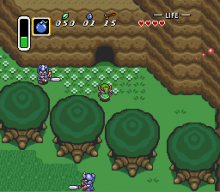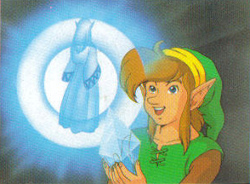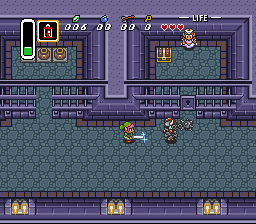The Incorporation of Story into Zelda Games
Posted on December 30 2014 by Mark Olson
 There is a long list of what Zelda fans expect in each new iteration of the series and up until recently, a decent story was not one of them. In my eyes, it still shouldn’t be.
There is a long list of what Zelda fans expect in each new iteration of the series and up until recently, a decent story was not one of them. In my eyes, it still shouldn’t be.
Hit the jump for more.
Zelda games developed prior to Majora’s Mask (and even that game, to an extent) followed a “get a couple of items, kill a couple of guys, kill a bigger guy, and watch the credits” approach to story. Note how the last sentence included no clause about emotional depth. Characters were no more than quest givers (Sahasrahla in A Link to the Past or The Owl in Link’s Awakening) or plot macguffins (Princess Zelda in numerous games or the Seven Maidens in A Link to the Past). The tales told in any game preceding to Majora’s Mask existed almost entirely as petty justification for player action, an excuse to get the audience into a dungeon without identifying each as level 1 or level 2.
Majora’s Mask changed all that. Characters were actually characters and not merely props with pants. Given all the talk about Majora’s Mask that has been present in the past couple of weeks, I will merely say that as far as Zelda stories go (and video game stories, for that matter), it has surprising complexity and, though broad in scale, manages to connect everything to the human aspect. The game’s narrative birthed a cult classic. In my eyes, however, this doesn’t matter.
Good stories are more than welcome in a Zelda title, but I do not think that it should be taken into account for judging a good entry in the series, or counted among the series’ areas of focus. It can earn a game extra points, sure, but I come to Zelda for gameplay. In a game like Bioshock, story is at the forefront. The game is sold for its complexity of narrative and, though the gameplay is functional, the story and game world are what pulls the player along up until the bitter end. In The Legend of Zelda, however, gameplay was always the primary focus; Miyamoto has said that, when developing Skyward Sword, their first concern was getting the motion controls to work properly. The relative success of the motion controls can and should be directly attributed to their implementation in the game being the primary focus during development. Contrast this with the aforementioned Bioshock, a game where a heavy focus during development was placed on the writing of the game’s narrative. The gameplay in Bioshock can be fun, but I would not choose to play a game centered around Bioshock-style gameplay. The story is what moves units. Since there are deadlines for when development should end, the creative teams needs to pick and choose what to focus on. Obviously, the aspects of a game receiving more attention get better than those that don’t, as a general rule. I would rather not have the development team spend more time on story and risk the quality of gameplay suffering as a result.
The 2D games in the franchise are the games that best show how a good story is not necessary to have a good Zelda game. A Link to the Past draws the player in not because of the tale it had to tell but because of the experiences already had and those that were yet to come. Did players care about saving the princess? For the most part, not in the slightest. Not a soul had even met the girl before Link had to rescue her. Did players care about killing things so as to get new items and thusly kill things better than before? Certainly. As a player who enjoys stabbing things and exploring well-designed locales, I progress through a game because I want to stab more things and explore more well-designed locales.
A good story is not required to rope a player along into whatever you want them to do when good gameplay is present. Stories in Zelda have taken themselves increasingly seriously when this isn’t necessary. Even Twilight Princess, with all of its melodrama, does not entice a player into combat by telling them that the story will advance. To have a cutscene every once in a while is a nice added bonus, sure, but the fun of playing is what should keep a player playing.
As always, would you kindly keep in mind that this is a work of opinion and that I am in no way, shape, or form attempting to pass this off as fact. Now that that’s out of the way, what do you guys think? Is story in Zelda a good thing? Would you like to see story take the forefront in Zelda U or just screw around in the open world?





